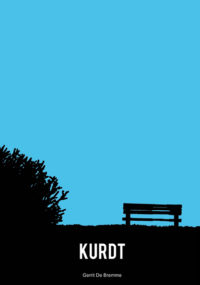Thursday Comics Hangover: Finding Nirvana

"Aberdeen is what you would call a shithole," Belgian cartoonist Gerrit De Bremme writes late in his debut comic Kurdt. "The economy is dead and there is not much happening." De Bremme has traveled from Europe to the Pacific Northwest in search of Kurt Cobain's birthplace. He's not a Nirvana superfan, but he's fascinated by the icon that Cobain has become, and he's hoping to find the humanity at the heart of the rock-star narrative that's grown up around the Nirvana story.
Kurdt is an impressionistic travelogue comic — much of it seemingly drawn from photoreference — with De Bremme's thoughts overlaid in a series of captions. It reads like a dreamy, earnest documentary, and part of the thrill for Seattle audiences is seeing De Bremme's interpretation of local landmarks like Gasworks Park, Green Lake and the seediness of Aurora Ave. The book is illustrated in a heavily polarized black-and-white, with panels that resemble overexposed photographs. And De Bremme has doused each page in moody shades of blue, reflecting his own state of mind and his interpretation of the rainy Pacific Northwestern climate.
At times, Kurdt gets a little too earnest, and De Bremme allows himself to collapse into cliche. (The most egregious line: "Now I'm back in the Emerald City, ready to tackle that big grungy elephant in the room.") These lapses in narrative discipline are common enough in books about iconic celebrities — there's not much substance to grab hold of in the entirety of Cobain's 27-year existence, so writers tend to get a little too vague, a little too grandiose, in their interpretations. When De Bremme stares directly at Cobain, he's furthest from understanding him.
But Kurdt isn't really about understanding Cobain any better as a human being. It's about how the places we're from shape us, and how we either grow beyond those formative experiences or we stay rooted in place forever. It's about traveling halfway around the world for basically no good reason and trying to make the most of it. It's a tone poem about De Bremme finding his place in the world, even in a place that's as far from his home as is humanly possible.